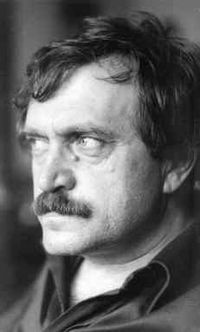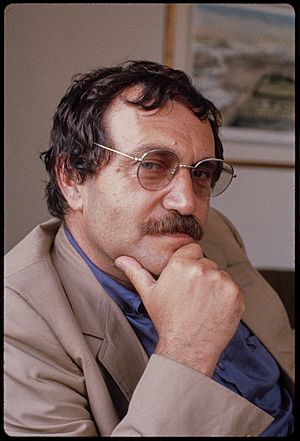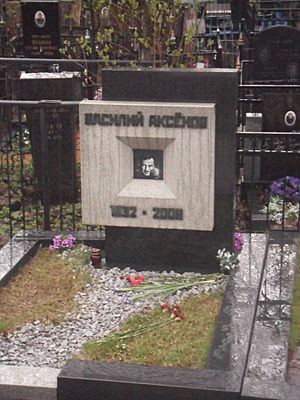Vasily Aksyonov facts for kids
Quick facts for kids
Vasily Aksyonov
|
|
|---|---|
 |
|
| Born | Vasily Pavlovich Aksyonov August 20, 1932 Kazan, Soviet Union |
| Died | July 6, 2009 (aged 76) Moscow, Russia |
| Occupation | Doctor, writer |
| Nationality | Russian |
| Alma mater | Kazan University and First Pavlov State Medical University of St. Peterburg |
| Period | 1950s–2000s |
| Notable works | The Burn, The Island of Crimea and The Moscow Saga, known in English as Generations of Winter |
Vasily Pavlovich Aksyonov (born August 20, 1932 – died July 6, 2009) was a famous Russian writer. He wrote many novels, which are long stories. He became well-known in other countries for his books. These include The Burn and Generations of Winter. Generations of Winter tells the story of the Gradov family. It follows them through three generations, from 1925 to 1953.
Contents
Early Life
Vasily Aksyonov was born in Kazan, Soviet Union, on August 20, 1932. His mother, Yevgenia Ginzburg, was a journalist and teacher. His father, Pavel Aksyonov, held an important job in Kazan. Both of his parents were active members of the Communist Party.
However, in 1937, his parents were arrested. They were accused of being against the government. They were sent to the Gulag, which were forced labor camps. They spent 18 years there but survived. Later, his mother wrote a famous book. It was called Into the Whirlwind. This book described the harsh life under Stalin's rule.
Vasily stayed in Kazan with his nanny and grandmother. But then, the NKVD (a secret police force) took him away. They sent him to an orphanage. They did this because his parents were seen as "enemies of the people". His family did not know where he was. In 1938, his uncle rescued him. Vasily lived with his uncle's family for a while.
In 1947, Vasily joined his mother. She had been released from the camps but was sent to live in exile. This was in a very cold area called Magadan, Kolyma. He finished high school there. Vasily's older half-brother, Alexei, died from hunger in Leningrad in 1941.
His parents wanted Vasily to become a doctor. They thought doctors had a better chance to survive in the camps. So, he studied medicine. He went to Kazan University. In 1956, he graduated from the First Pavlov State Medical University of St. Peterburg. He worked as a doctor for three years. While he was a student, the KGB (another secret police group) watched him. They were collecting information about him. He might have been arrested, but Stalin died in 1953. This led to a time of more freedom.
Career
After Stalin died, life in the Soviet Union became a bit more open. Vasily Aksyonov met young people called stilyagi. They were known for their unique style. They liked Western fashion, music, and dancing. Aksyonov loved their slang and their interest in jazz music.
This time changed Aksyonov's life. He decided to become a writer. He wanted to write about the world around him. He always paid close attention to young people. He watched their changing styles and trends. He understood popular culture better than most Soviet writers.
In 1956, a famous Soviet writer, Valentin Kataev, noticed Aksyonov. Aksyonov's first story was published in a magazine called Youth. His first novel, Colleagues (1961), was based on his time as a doctor. His second book, Ticket to the Stars (1961), was about young Soviet hipsters. This book made him famous very quickly.
In the 1960s, Aksyonov wrote often for the popular Yunost ("Youth") magazine. He became a regular writer there. He was a leader in the "youth prose" movement. He was popular with liberal thinkers in the Soviet Union. His writing was different from the usual, serious Soviet stories.
Aksyonov was very different from another famous writer, Aleksandr Solzhenitsyn. Solzhenitsyn wrote about the harshness of the Gulag. Aksyonov, however, was a symbol of youth and freedom. He loved fashion and jazz. But like Solzhenitsyn, Aksyonov was eventually forced to leave the Soviet Union.
Nina L. Khrushcheva, a friend of Aksyonov's family, explained it well. She said Solzhenitsyn wrote about being in prison and trying to get out. Aksyonov wrote about young people whose parents got out. They could now live their lives. Aksyonov brought a "light of personal freedom" to his writing.
However, Aksyonov's love for American culture caused problems. The KGB did not like his liberal ideas. In 1979, he worked on an independent magazine called Metropol. This led to a big conflict with the government. His next two important books, The Burn and The Island of Crimea, could not be published in the Soviet Union. The Burn was about the struggles of smart people under communism. The Island of Crimea imagined what if the White Army had won in 1917.
When The Burn was published in Italy in 1980, Aksyonov and his wife, Maya, were invited to leave Russia for the US. Soon after, the Soviet government took away his citizenship. He got it back 10 years later, during a time of change called Perestroika.
Aksyonov lived in Washington, D.C. and Virginia for 24 years. He taught Russian Literature at George Mason University. He also taught at other American universities. He worked as a journalist for Radio Liberty.
He kept writing novels. One of his big books was Generations of Winter (1994). This was a long story about Soviet life over many generations. It became a successful TV show in Russia. This story, also called The Moscow Saga, described three generations of a Soviet family. It covered the time between the 1917 revolution and Stalin's death in 1953. The TV show had 24 episodes and aired in Russia in 2004. In 1994, he also won the Russian Booker Prize. This is Russia's top award for books. He won it for his book Voltairian Men and Women. It was about a meeting between the philosopher Voltaire and Empress Catherine II.
In 2004, he moved to Biarritz, France. He visited the US less often. He spent his time between France and Moscow. His novel Moskva-kva-kva (2006) was published in a Moscow magazine.
Aksyonov's books were translated into many languages. He remained an important writer in Russia. Besides novels, he also wrote poems. Some of these poems were even performed as songs. He was always seen as a stylish and modern person. He was known for his mustache, nice suits, and love for big cities, good wine, and food.
Vasily Aksyonov died in Moscow on July 6, 2009, at the age of 76.
Political Views
Vasily Aksyonov was strongly against totalitarian rule. This means he was against governments that control everything. He once said that if Russia started putting up Stalin statues again, he would have to reject his home country.
Novels
Here are some of his other novels:
- Colleagues (1960)
- Ticket to the Stars (1961)
- Oranges from Morocco (1963)
- It's Time, My Friend, It's Time (1964)
- It's a Pity You Weren't with Us (1965)
- "Half-way To The Moon" (1966)
- Overstocked Packaging Barrels (1968)
- "My Grandfather Is A Monument" (1970)
- "Love for Electricity" (1971)
- In Search of a Genre (1972)
- "Our Golden Piece Of Metal (1973)
- "The Burn" (1975)
- Translation of E.L. Doctorow's Ragtime into Russian (1976)
- The Island of Crimea (1979)
- "The Steel Bird and Other Stories" (1979)
- "Paper Landscape" (1982)
- Say Cheese (1983)
- In Search of Melancholy Baby (1987)
- Yolk of the Egg (written in English, then translated to Russian by the author, 1989)
- Generations of Winter (English version of "Московская сага", 1994)
- The Winter's Hero (English version of Tiur ma i mir, 1996)
- The New Sweet Style (1998)
- "Cesarean" (2000)
- Voltairian Men and Women (2004 – won the Russian Booker Prize)
- Moscow ow ow (2006)
- Rare Earths (2007)
Theatre
- Colleagues 1959
- Always In Sale 1965
- Duel 1969
- The Four Temperaments published in the Literary Almanac "Metropol", New York and London 1979
See also
 In Spanish: Vasili Aksiónov para niños
In Spanish: Vasili Aksiónov para niños
 | Stephanie Wilson |
 | Charles Bolden |
 | Ronald McNair |
 | Frederick D. Gregory |



